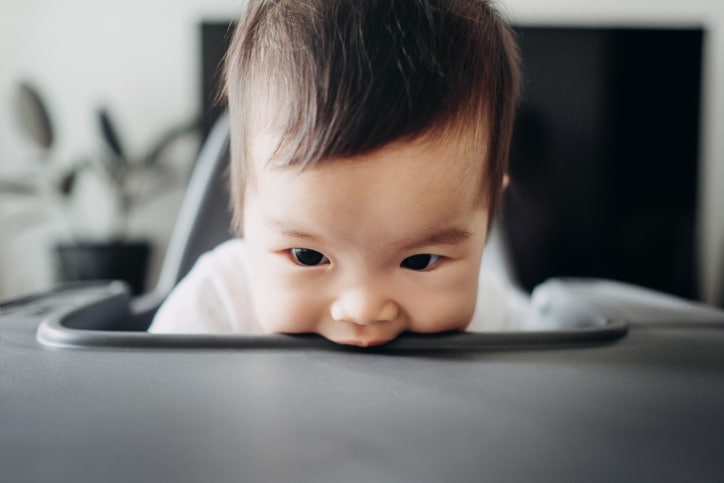Can your baby be teething at 3 months old?
While most infants get their first teeth between 4 and 6 months old, it’s still perfectly normal for teeth to erupt sooner. In fact, although rare, babies can actually be born with teeth!
It’s not unusual for teething symptoms to begin at 3 months old. And when it starts, you’ll likely observe the same side effects: excessive drooling, chewing or gnawing on fists or toys, crankiness and lack of sleep (as if that’s not already an issue!). You might even see a little tooth bud weeks or even months before anything erupts. But, what if teeth actually come in at this age?
“If an infant is getting teeth at three months, it is likely due to heredity and what the child may be doing with the mouth,” says Diane Bahr, MS, CCC-SLP. For example, “if the child is doing a lot of biting and chewing on fingers and toys, teeth may emerge early,” she adds.
Parents and caregivers dealing with their baby’s new pearly whites often have questions about how that cute new grin can affect things like breastfeeding or starting solid foods. Here are a few answers to ease your concerns:
1. Is my baby in pain? What can I do to help?
How your little one deals with teething really depends on them. According to Danelle Fisher, MD, “[Teething] can take weeks to months and can cause some babies a great deal of pain where others take it in stride.” Topical anesthetics are tempting to caregivers who want to help ease the baby’s discomfort, but Dr. Fisher and the American Academy of Pediatrics (AAP) warn this isn’t a good idea.
“Parents should avoid any product such as gel with the ingredient bupivacaine or lidocaine in it, as these can be dangerous for children less than one year of age, causing a blood disorder,” says Dr. Fisher. “[Your] baby can use a teething ring with liquid or gel inside that has been refrigerated (the freezer is too cold). Also, some natural remedies or homeopathic remedies can help.”
Nevertheless, consult your pediatrician if these remedies don’t seem to do the trick.
2. How will teething affect my breastfeeding?
Some mums’ first inkling that their baby is teething comes with a firm and unexpected clamp down on their breast. Whether it happens when he’s teething at 3 months or later down the road, it will happen eventually. Congrats, you’re officially a teething toy!
A rude awakening, for sure, but your natural reaction is actually the best solution for your little chomper: Take him off the breast with a firm, “Ouch!” or, as Dr. Fisher suggests, “No bite!” before letting him resume feeding. It may happen several times, even before his teeth fully emerge, but it will work. Be sure to use the same words and tone each time so he knows you’re serious. If you continue to experience breastfeeding problems you believe are connected to teething, Bahr suggests seeing a lactation consultant.
If you were planning to breastfeed only until your baby’s teeth erupt, however, speak to your pediatrician about how to wean successfully and what type of formula is best for him.
3. Does early teething mean early solids?
Although there’s some conflicting research of late, the AAP still suggests starting your baby on solids at no younger than 6 months old. Those early teeth do cause her to chew more, but her little belly isn’t quite ready for solid food. Provide lots of safe toys to nibble on and keep an eye out for signs she’s ready for solids.
4. Will early teething affect mouth development?
Bahr says, “Parents should take the child to a pediatric dentist to evaluate the health and development of early emerging teeth.” She cautions that some activities and issues can affect development, too. “Excessive pacifier use and thumb-sucking [that goes beyond 10 months] can inhibit the developmental mouthing and teething process.”
A special note for parents and caregivers who bottle-feed or use pacifiers: While your baby is teething, keep an eye out for nipple wear. Babies often gnaw on the nipples of their bottle/pacifier, and the tip can become separated and pose a choking hazard. If there is any noticeable wear on either, replace it right away. If you have a childminder, make sure they do the same.
Margie Mars is the mother of eight and Grandma of three. She writes for several top parenting sites and specialises in Attachment Parenting and Autism.
* This article is for general informational purposes only. It is not intended nor implied to be providing medical advice and is not a substitute for such advice. The reader should always consult a health care provider concerning any medical condition or treatment plan. Neither Care.com nor the author assumes any responsibility or liability with respect to use of any information contained herein.
